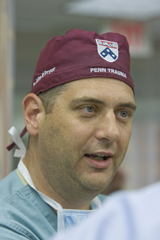On Christmas Day 2008, Penn Medicine lost a friend and colleague with the death of John “JP” Pryor, MD. Dr. Pryor was serving his second tour of duty in Iraq with a forward surgical team with the Army’s 1st Medical Detachment when he was killed by enemy fire. Feeling an obligation to lend his skills to help those serving our country and the many victims of war, Pryor had joined the Army Reserves after learning that trauma surgeons were desperately needed.

John Paul Pryor, MD
The impact of Pryor’s life and death resonated beyond his friends and family, and over the past few years, his memory has been a guiding force as Penn Medicine built its the new trauma center at Penn Presbyterian. On Wednesday, May 4, 2016, Penn leaders will welcome Pryor’s family, friends – including military and congressional dignitaries – to celebrate the dedication of the John Paul Pryor, MD, Shock Trauma and Resuscitation Unit in the Trauma Center at Penn Presbyterian Medical Center. Penn Medicine’s Level One Trauma Center treated 17 percent more trauma patients (2,592 patients) in 2015 – its first year in its new location since transferring from the Hospital of the University of Pennsylvania – than in 2014.
Penn Medicine has a long and transformative history with the military, dating back to some of Penn Medicine’s earliest graduates’ involvement in the Civil War. More recently, the trauma program at Penn Medicine has taken an active role in training military surgeons in trauma and critical care – skills that are vital to saving lives on the battlefield. Since 1996, the trauma program has trained more than 20 military fellows who have returned to active duty. And today, dozens of Penn Medicine physicians and staff currently wear two uniforms, both working in medicine here and serving as members of the National Guard or Reserve forces.
Tours of the John Paul Pryor, MD, Shock Trauma and Resuscitation Unit will be available. Click here for more information about Penn Medicine’s Level One Trauma Center at Penn Presbyterian Medical Center’s Pavilion for Advanced Care.
Date: Wednesday, May 4, 2016
Time: 5:30 p.m. – 7:00 p.m.
Location:
Penn Presbyterian Medical Center
Pavilion for Advanced Care – Grand Concourse and Healing Garden
51 N. 39th Street
Philadelphia, PA 19104
Parking for media will be available on the west side of 38th street.
WHO:
- Amy Gutmann, president of the University of Pennsylvania
- J. Larry Jameson, MD, PhD, executive vice president, University of Pennsylvania Health System, and dean of the Perelman School of Medicine at the University of Pennsylvania
- Ralph Muller, CEO, University of Pennsylvania Health Systems
- Michele Volpe, CEO, Penn Presbyterian Medical Center
- Eric Schoomaker, MD, PhD, retired Army Lieutenant General, former Surgeon General of the U.S. Army, and Commanding General, U.S. Army Medical Command
- Brad Wenstrup, DPM, Army Reserve Lieutenant Colonel, and U.S. Congressman
- C. William Schwab, MD, a professor of Surgery in the division of Traumatology and Surgical Critical Care, and physician-in-chief of PennSTAR
Penn Medicine is one of the world’s leading academic medical centers, dedicated to the related missions of medical education, biomedical research, excellence in patient care, and community service. The organization consists of the University of Pennsylvania Health System (UPHS) and Penn’s Raymond and Ruth Perelman School of Medicine, founded in 1765 as the nation’s first medical school.
The Perelman School of Medicine is consistently among the nation's top recipients of funding from the National Institutes of Health, with $580 million awarded in the 2023 fiscal year. Home to a proud history of “firsts,” Penn Medicine teams have pioneered discoveries that have shaped modern medicine, including CAR T cell therapy for cancer and the Nobel Prize-winning mRNA technology used in COVID-19 vaccines.
The University of Pennsylvania Health System cares for patients in facilities and their homes stretching from the Susquehanna River in Pennsylvania to the New Jersey shore. UPHS facilities include the Hospital of the University of Pennsylvania, Penn Presbyterian Medical Center, Chester County Hospital, Doylestown Health, Lancaster General Health, Princeton Health, and Pennsylvania Hospital—the nation’s first hospital, chartered in 1751. Additional facilities and enterprises include Penn Medicine at Home, GSPP Rehabilitation, Lancaster Behavioral Health Hospital, and Princeton House Behavioral Health, among others.
Penn Medicine is an $11.9 billion enterprise powered by nearly 49,000 talented faculty and staff.